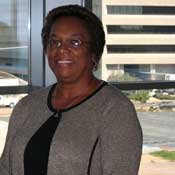Jackson Police Department Chief Rebecca Coleman warned Jackson City Council members yesterday that renewing the city's curfew for minors raises a series of issues, including where to house offenders.
Ward 3 Councilman Kenneth Stokes and other council members are championing an effort to bring back an expired 2007 curfew restricting Jackson residents under age 18 from being on a public street, highway, park, vacant lot, establishment, or other public place during the hours of 10 p.m. and 6 a.m. on weekdays, and midnight to 6 a.m. on Saturday and Sunday.
"We have to work out where the child will be housed from the time he's picked up by law enforcement and the time he is back in the possession of his parents," Coleman told a council planning committee yesterday. "They have to be placed somewhere until a parent or guardian can take possession of this child, But, presently, the youth detention center is moving away from housing status offenders because of (a) law that prohibits status offenders from being placed in the same facility as a criminal youth offender, so where will the child be?"
Status offenders are minors who are guilty of violating curfew, but have no other criminal charges on them. Coleman said police attempt to contact the youth's parent or guardian for collection, but occasionally police run across a child whose parent or guardian cannot be reached. Prior to 2009, police stationed the unclaimed youth at the Henley-Young Juvenile Detention Center, but that is no longer possible.
"With things like they are, this ordinance basically turns the police into some kind of baby-sitter," Coleman said.
The city had 1,300 recorded violations by the ordinance's expiration in 2009, City Deputy City Attorney Michele Purvis said.
Stokes asked if police could station the child at a police precinct, but Coleman pointed out that precincts are not 24-hour facilities, and are generally unavailable during curfew hours.
Officials at the detention center did not return calls for comment. Mississippi ACLU Executive Director Nsombi Lambright said she did not believe the juvenile detention center's policy of not accepting status offenders is a new policy.
"I don't think this is a change in policy," Lambright said. "I just don't think it was ever enforced until now."
Lambright referred additional questions on the monitoring of the detention center to the Southern Policy Law Center.
Southern Poverty Law Center Deputy Legal Director Sheila Bedi did not immediately return calls for comment on SPLC's investigation of the detention center, but SPLC complained to the media last year about treatment at the detention center, including housing children who, according to SPLC, did not belong there.
JPD Deputy Chief Brent Winstead would not confirm if Henley-Young's policy of not accepting status offenders was an official policy prior to the expiration of the curfew last year.
When police transport a minor to the Henley-Young Juvenile Detention Center for a curfew violation, the ordinance also requires that "the minor's parent shall be issued a written warning. For a second parental offense, a parent shall be fined $25." The ordinance increases the parent or guardian's penalty for each subsequent offense by an additional $25, to $50 for the third offense and $75 for the fourth offense.
Also, the ordinance fines the owner, operator, or any employee of an establishment $100 for retaining a minor past curfew for employment, with an additional $50 increase on each subsequent offense.
Winstead said he wanted to "put parents on notice" by leveraging the $25 fine on the first offense, instead of waiting until the second offense, as noted in the ordinance.
"My opinion is that it's not the children who are the problem so much as it is the parents for not keeping up with them," Winstead said. "...We should go ahead and put that fine on the first offense."
Stokes said he agreed with Winstead's idea, as long as parents who could not afford the $25 penalty could manage some other form of restitution, and asked city legal to adopt the ordinance per the deputy chief's request.
Stokes said he would address the issue again in the planning committee's Sept. 1 meeting.
"We need to get the (Henley-Young Juvenile Detention Center) folks here to talk to us before we do anything else," Stokes said.



Comments
Use the comment form below to begin a discussion about this content.